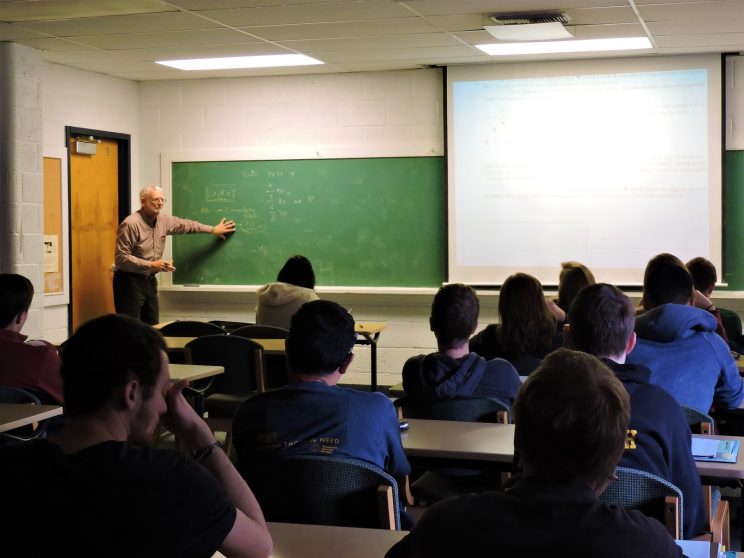A Farewell to Astronomy: Jim Yoder looks back on 50 years of “aha!” moments
By Sarah Miller – Horizon News & Features Editor

If you’re starting to feel restless in your classes, you’re not the only one. So is Jim Yoder. Even as he finishes out 50 years of teaching at Hesston College, Yoder admits he has struggled to focus on his classes instead of looking forward to the future. Even so, you can hear excitement in his voice as he talked about astronomy, one of his many passions.
But after offering astronomy as a course since the mid 90s, Hesston College is removing it from next year’s course catalog. Jim Yoder, professor of chemistry, first introduced some principles of astronomy in 1971, when inter-term was integrated into Hesston’s academic schedule. The course drew interest as Yoder combined aspects of science and faith in his teaching.
“Astronomy has always sort of been a hobby, not in the sense of actual making things and doing things, but a hobby of interest,” Yoder said.
Yoder appreciates the uniqueness of questions that come up in a Christian institution, which combines traditional astronomy themes and faith.
“How could you not talk about evolution when the scientific evidence is that the universe began 13 or 14 billion years ago?” he said. “And what does that mean in terms of our faith and of our scripture? How can we bring that together, and how can we not? Places like Hesston are a great laboratory to develop these kinds of questions.”
Sophomore Kate Kilmer agrees.
“Jim encourages us to relate everything we learn in astronomy to our faith,” she said. “General Astronomy strengthened my beliefs about the world by giving me a greater sense of how everything in the universe was made. My biggest takeaway is the fact that there is so much left to discover!”
Yoder believes that concepts of evolution are important for Christian institutions to address and question.
“I try to make it so clear that I’m not trying to change anybody’s faith, but this is an academic institution so we can talk about our faith,” he said. “We can lay it out there and critique it without threatening each other. Nobody has the perfect answer to all of this.”
In order to answer these questions, however, students must first understand the science behind it, Yoder said.
“For some people, the science does not come easily,” he said. “If you’re not used to the math or scientific concepts, then yes, it can seem quite hard. But to grapple with these questions requires some foundation of understanding of the science of it if we’re going to talk and discuss intelligently about it.”
But the moments of success are worth the wait.
“Year after year, it is very gratifying to see students have ‘aha’ moments throughout the course,” Yoder said. “And ‘aha’ moments for myself! Students are intriguing and provocative over the years. They challenge me in all kinds of ways.”
What does Yoder hope each student gets out of astronomy?
“A tremendous, wondrous appreciation for the magnitude and elegance and mystery of creation,” he said.



